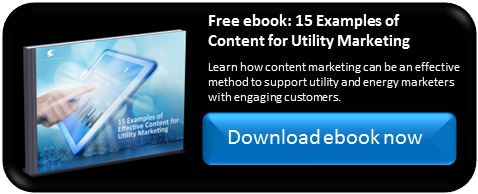
J&C Blog
Find all the latest marketing trends on the J&C Blog.

Find all the latest marketing trends on the J&C Blog.
Utility marketers face a unique challenge in that they generally must work harder than other industries to engage small and medium-sized business customers. These business owners and managers are focused on their own daily operations and tend to forget about their utility services until a problem arises or a bill arrives. As a result, they often miss out on programs that can help them manage their energy and optimize efficiencies.

For utility marketers, envisioning a campaign for services that people can neither see nor touch can be difficult. But it is doable and the results can be impressive with a little support from content marketing.
The object of content marketing is to inform and guide business customers in the decision-making process. When paired with other channels, content marketing delivers on multiple levels. Most importantly, it allows utility marketers to connect with their target audience on an ongoing basis, which helps prevent disengagement.
That said, it’s important to choose your topics wisely. Content generates interest when it focuses on business needs and preferences. Check out the following examples of energy management topics for utility content marketing to help you get started.
Making energy efficiency projects appealing.
Energy management is a low-involvement category for businesses. Energy efficiency programs present an opportunity to shift this mindset, but it’s not an easy task. Utility marketers need informative content that makes energy efficiency projects appealing. Energy efficiency projects should be relevant to the business’s goals of reducing expenses and managing costs. The content needs to convince business owners and managers that energy efficiency is an obtainable objective, even with their busy schedules.
 As you create content about energy efficiency initiatives, make sure you provide examples and step-by-step instructions to help commercial customers understand how the benefits of energy efficiency can be realized in their business. If possible, link the article to a web page where business customers can take the next step. It’s important to ensure that these busy customers move on to the next phase of the transaction while it’s fresh on their minds. Marketers can also include downloadable content within the article to add to the conversion effort. Content marketing presents the perfect opportunity to move customers through your website to access tools for managing energy and links related to your energy efficiency topic with calls to action.
As you create content about energy efficiency initiatives, make sure you provide examples and step-by-step instructions to help commercial customers understand how the benefits of energy efficiency can be realized in their business. If possible, link the article to a web page where business customers can take the next step. It’s important to ensure that these busy customers move on to the next phase of the transaction while it’s fresh on their minds. Marketers can also include downloadable content within the article to add to the conversion effort. Content marketing presents the perfect opportunity to move customers through your website to access tools for managing energy and links related to your energy efficiency topic with calls to action.
This might sound like a lot to include in your article, but don’t be afraid to be thorough. It is a best practice to aim for at least 600 words in a content marketing article.
Another way to make energy efficiency projects more appealing with utility marketing is to include downloadable content within the article. For example, a downloadable infographic titled “Where’s the Waste?” enabled businesses to identify unnecessary costs. Another successful download was an ebook that pinpointed ways businesses could cut back on energy expenses. This allows businesses to depart from more traditional forms of instruction without losing any substance.
Budgeting and financing.
This topic will always be relevant to business customers because energy isn’t generally discounted. Whenever there’s an opportunity for business owners and managers to control expenses, it’s easier to get their attention. Take advantage of this by covering what they want to hear. Inform with a purpose.
This topic can go in many directions. Consider all the expenses involved in the energy management and operation of a business in the industry you’re targeting. Now consider all the parties involved in the process: contractors, equipment manufacturers and business owners, to name a few. The more business customers know about their financing options, the better equipped they’ll be to budget accordingly. If business owners and managers have different financing options available to them, let them know. If projects they are considering are eligible for rebates, let them know. Include all relevant information to help guide businesses through their financing options.
As a best practice, make sure you include keywords in your title and throughout your article (at least six mentions total) for search engine optimization. For example, you might choose to write about financing options for small businesses, so your keyword or phrase might be “utility budgeting” and the title might go something like, “Utility budgeting for small and medium-sized businesses.” As you create your utility content marketing article, stay as close to the subject matter as possible. Save any digressions and asides for another article.
Working with a contractor.
Contractors have a major impact on the success of an energy efficiency project. Some business customers make the mistake of hiring the first contractor that appears in the phone book or online. Utility content marketing can steer decision makers in the right direction by laying out all the facts about hiring and working with a contractor.
This topic has endless possibilities because there’s a contractor for nearly every kind of project. Utility marketers can demystify energy management by providing customers with question prompts to help them zero in on the best contractor for their needs. You might ask questions about the contractor’s training, or about warranties for equipment and workmanship, or whether the contractor has training for a specific system that needs to be installed. As you develop the content for this topic, establish your position as an authority by educating customers and taking them to the finish line. Content marketing is meant to get customers to act by guiding them with information, so get behind that lectern and educate.
Business customers will especially appreciate information about contractors because contractors are about as ubiquitous as lawyers. They’re everywhere, and there’s one for every cause. Utility marketers can compile a list of the different types of contractors and include other relevant information in an ebook or guide titled “Questions to Ask Before Hiring a Contractor.” Lay out all the information plainly and in terms customers can follow to hold their attention.
The skills required of a utility content marketer are varied and sometimes left undefined. Different clients have different needs, and marketers must be able to accommodate them. To learn more about content marketing for utilities, sign up for Jacobs & Clevenger’s free webinar for effective ways to create engaging content.
Topics: Utility Industry
303 E Wacker Drive, Suite 2030
Chicago, IL 60601
Phone: 312-894-3000
Fax: 312-894-3005